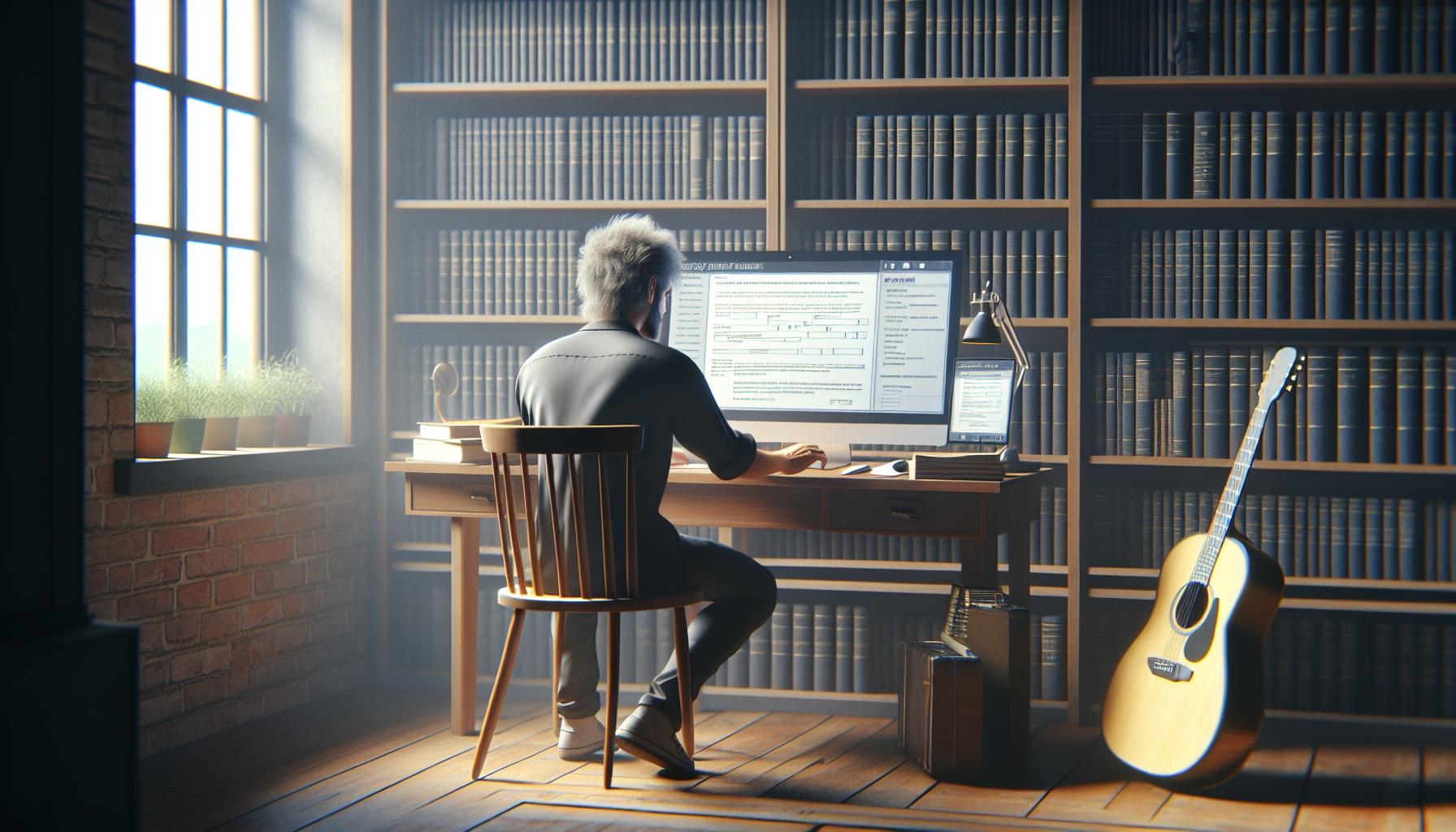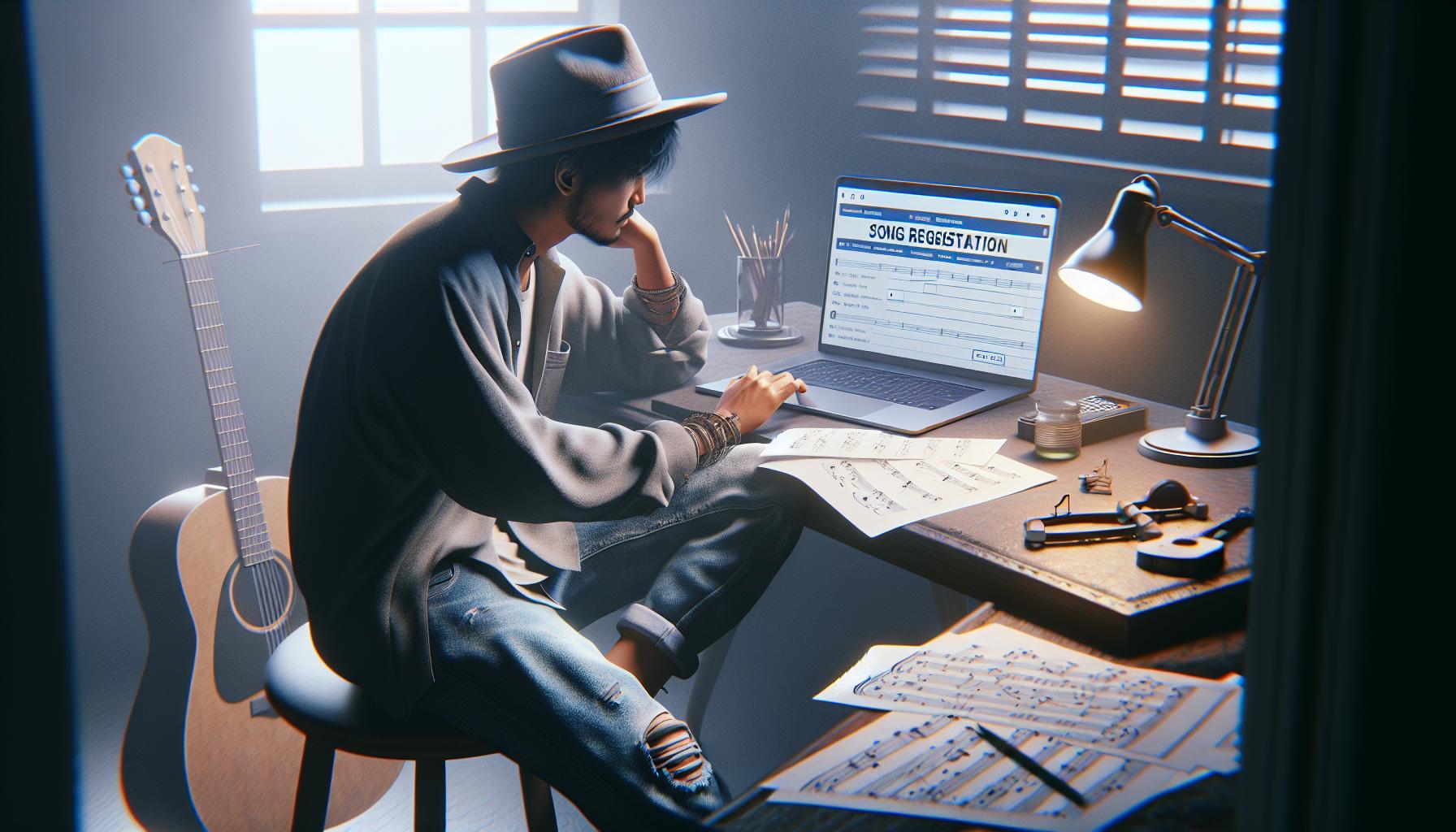You’ve poured your heart and soul into creating your music. It’s your masterpiece, your brainchild. But how do you ensure it’s protected? That’s where music copyright comes in. It’s the legal shield that safeguards your music from being used without your permission.
Understanding copyright registration can be a challenging task. But don’t worry, I’m here to simplify it for you. In this article, we’ll delve into the world of music copyright, its importance, and how you can use it to protect your musical creations.
So, whether you’re a budding artist or a seasoned musician, this guide will equip you with the knowledge you need to secure your music. Let’s dive right in and explore how copyright registration can be your music’s best friend.
Contents
What is Music Copyright?
Music copyright is a legal mechanism designed to protect the unique expression of an artist or composer’s creativity. In its purest sense, it grants an exclusive right to the creator over the use of their original musical composition. This includes the lyrics, melody, rhythm, and everything else that makes the music uniquely theirs.
Why is this so important? Think of it this way: your music is not just art, it’s your intellectual property. Just like you wouldn’t want your tangible property, let’s say a house, taken away without consent, your music deserves the same level of protection. Here lies the core essence of music copyright.
By having your music copyrighted, it means you have total control over who uses your music, where it’s played, and how it’s used. This extends to reproductions, public performances, and distributions. As a copyright owner, you have clear, legally backed power over the decisions made about your music. It’s the heart of why you need to understand and establish music copyright.
Furthermore, music copyright can last long after you’ve left the stage. In most cases, copyrights last for the life of the author plus 70 years, reservoirs of potential revenue for descendants. This longevity of protection offers more than just a safeguard for your music today, it promises future generations with a legacy anchored in the creativity you’ve put in.
But, let’s be clear, copyright doesn’t just pop into existence. There are necessary steps to take to ensure your music is copyrighted. This involves a process called copyright registration, and while it may sound tedious, it’s a critical aspect to consider. Let’s delve into how you can secure your music with copyright registration next.
Importance of Copyright Registration for Musicians

In the world of creativity and artistry, it’s vital to safeguard what’s truly yours. Specific to music, one effective way is through copyright registration. It’s not merely a piece of paper but a mighty protection tool. It provides a legal shield for the unique expressions of musicians, including their lyrics, melody, and rhythm.
When you register your music with the copyright office, you’re sending out a loud and clear message – “This is my work, and I hold exclusive rights to it”. You control who uses your music and how. It’s your key to protect against unauthorized reproductions, public performances, and distributions.
But that’s not all. Copyright protection doesn’t expire soon; it indeed goes beyond your life expectancy. It will stay in force for the duration of your life, plus an extra 70 years. That means your music lives on, and the potential revenue will provide a legacy for your descendants.
Table 1: Lifespan of a Copyrighted Work
| Author’s Life | Additional Years | Total Protection Duration |
|---|---|---|
| Assumed 70-80 Years | 70 Years | 140-150 Years |
So, what’s the importance of having music copyrighted?
- Legal Protection: With a copyright, you can take legal action against anyone who uses your music without permission. It is your legal proof.
- Control of Art: You decide where and how your music is used.
- Longevity: Provides potential revenue for years and even after your lifetime.
Notice a pattern? It all revolves around one thing – control. It’s control over your creation, control over your revenue, and control over your legacy.
In the realm of music, copyright registration is not an option. It’s a necessity. It’s your silent guardian, your unsung hero. As artists, we need to rouse the hero. Understand the process and establish the copyright. So, let’s delve deeper into the steps to get your music copyrighted. Are you ready to claim what’s rightfully yours?
How Copyright Protects Your Music
When you weave your creativity into a melody, lyrics, or rhythm, it’s your unique expression of artistry. Copyright registration works like a safety net for musicians to hang onto their original creations. But how does it work?
A registered copyright puts the legal power in your hands. It becomes a public record of your ownership, providing legal protection against unauthorized use. In essence, copyright registration is a weapon that allows musicians to control how, where, and when their music gets played. But that’s only scratching the surface.
Beneath this, copyright offers musicians a way to monetize their creations. Here’s where things kick into high gear. Whether your music plays in a radio ad, becomes a chart-topping hit, or features in a blockbuster movie, you’re entitled to royalties. This means revenue will keep flowing, no matter what your creation is used for.
Even more than that, copyright is a legacy protection tool. Your copyright has an exceptional longevity. It lasts for your lifetime plus an additional 70 years. This means, even after you’re gone, your descendants could continue to benefit from your original piece, thanks to copyright law. We’ve prepared a simplified table for you to understand copyright duration:
| Copyright Holder | Duration |
|---|---|
| Individual | Life of the author + 70 years |
| Works for Hire | 95 years from publication or 120 years from creation, whichever is shorter |
As a musician, copyright registration is not an option, it is a necessity. When you control your creations, you control your revenue and ultimately, your legacy. A registered copyright is the key to this control.
And remember, copyright does not end at protection. It paves the way for compensation and continuity, establishing a lasting financial bridge for generations to come.
Understanding the Process of Copyright Registration
For musicians who are committed to protecting their music, it’s time we delve into the process of copyright registration. One of the first points to note is that copyright protection is automatic upon creation of your music. So why bother with registration? It’s simple. Registering your copyright officially documents your claim, providing stronger legal protection and facilitating actions against infringement.
So, let’s break it down.
The U.S Copyright Office is the organization that manages copyright registrations. You’ll start by visiting its official website and navigating to the registration page. They’ve streamlined their online system to make the process as user-friendly as possible.
To register your music, you need to prepare a few critical items before starting your application:
- A digital copy of your music – This can be a simple MP3 file or sheet music in a PDF format.
- Written confirmation of your music’s creation date – This could be a recording logbook, studio booking confirmation, or any other verifiable document.
- Details of all contributors – If your piece is a collaboration, you’ll need the full names and roles of all contributors.
Once you’ve compiled these items, you’re ready to go. Your application will go through several stages including submission, examination, and final registration. If there are any queries or issues, the U.S. Copyright Office will make contact to resolve them.
Applying for copyright registration incurs a fee, usually under $100. It’s a modest sum when you consider the value of securing your music’s license and future royalties. After the process is complete, you’ll receive an official certificate as proof of your copyright.
As we continue to explore the realm of music copyrights, remember this registration process isn’t just a procedure, it’s a way to ensure your musical legacy thrives long after the final note has played.
Benefits of Copyright Registration for Musicians

In my years of expertise, I’ve come across numerous benefits that copyright registration offers to musicians. It’s more than just a legal requisite; it’s a shield that protects creative expressions and aids in the musical journey. Let’s delve into some of these perks.
Establishes Public Record
Possessing a copyright registration establishes public evidence of your claim as the original creator. It’s on public record that you are the proprietor of your music. This is especially handy while dealing disputes regarding the original ownership of a piece.
Paves way for Legal Actions
Owning a copyright registration equips you with the authority to take legal action against infringers. In case your music is unlawfully used without your consent, you have the sturdy ground of a copyright registration to back up your lawsuit.
Enables Claiming Statutory Damages
In cases where infringement occurs, you, as a copyright owner, can seek statutory damages. These damages can range from $750 to $30,000 for each work infringed upon, according to the US copyright laws. It’s noteworthy that a court can increase this amount to up to $150,000 if the infringement is found to be deliberate.
| Statutory Damages for Copyright Infringement | Amount |
|---|---|
| Regular Amount | $750 – $30,000 |
| In case of willful infringement | Up to $150,000 |
Facilitates Collection of Royalties
Your music’s copyright registration paves the way for royalties. When someone uses your music, be it for sound recording, performing, or streaming, they’re lawfully obligated to pay you. The royalties come not just from the initial use, but also from each subsequent use of your music.
As we continue exploring the complex world of music copyright, let’s not forget the essence of it all. At its core, it’s about ensuring musicians receive credit for their original creations. It’s about laying a secure foundation that allows music and creativity to flourish with the assurance of rightful recognition and compensation. But, what about the challenges musicians face during copyright registration? Stay tuned as we navigate through this in our next section.
Conclusion
I’ve highlighted the importance of copyright registration for musicians throughout this post. It’s not just about claiming ownership—it’s about wielding the legal power to protect your music. With copyright registration, you’re equipped to fight against infringements and even claim statutory damages. Plus, it’s a gateway to collecting royalties for your music’s use. But it’s not all smooth sailing. Musicians do face challenges during the registration process. In my next post, I’ll delve into these hurdles and offer solutions to make the process easier. Stay tuned. Protecting your music is worth the effort.
